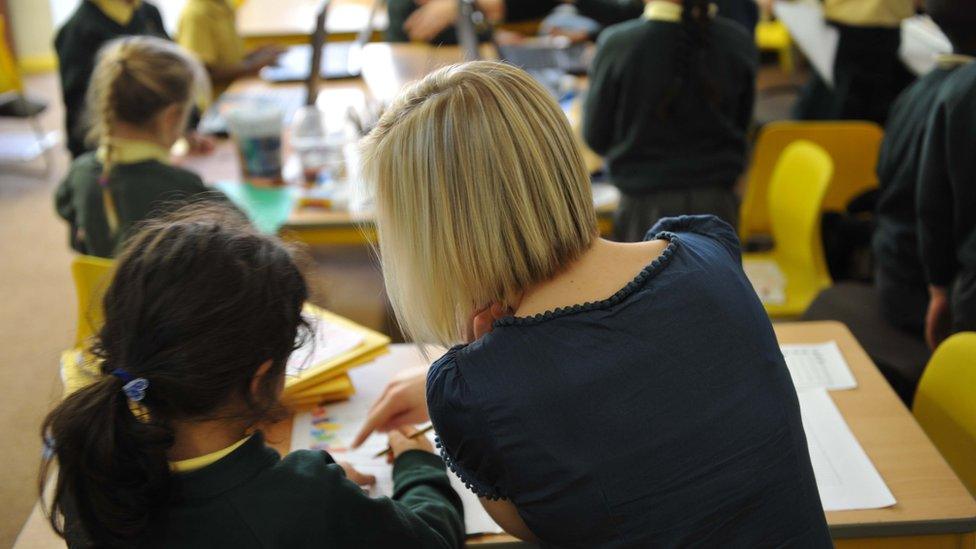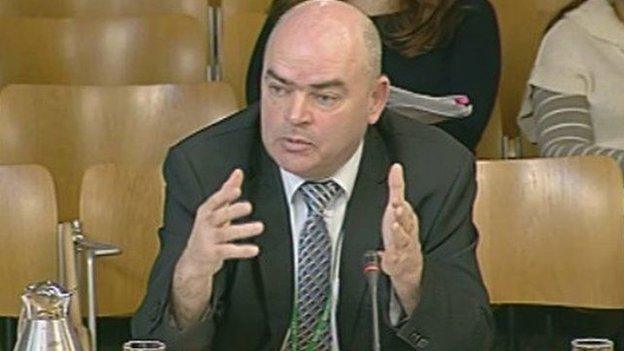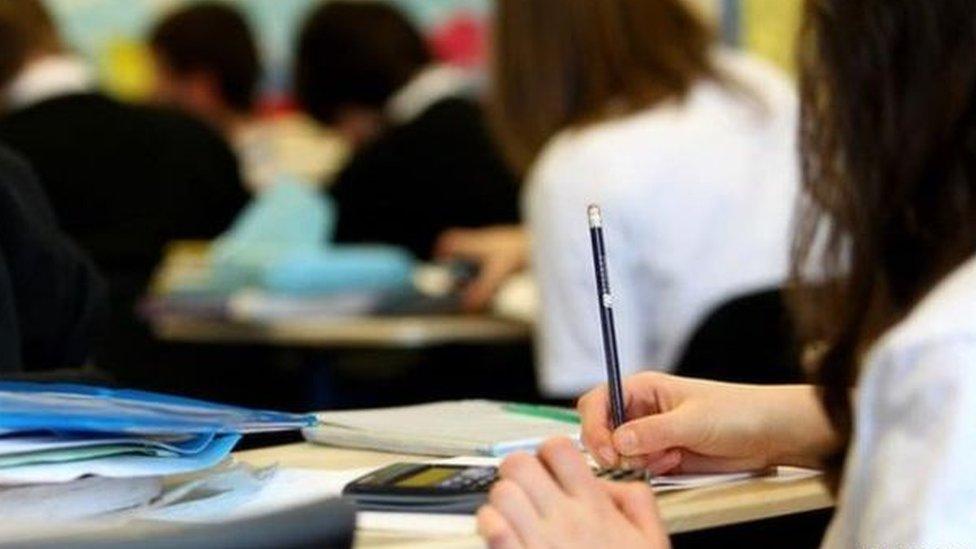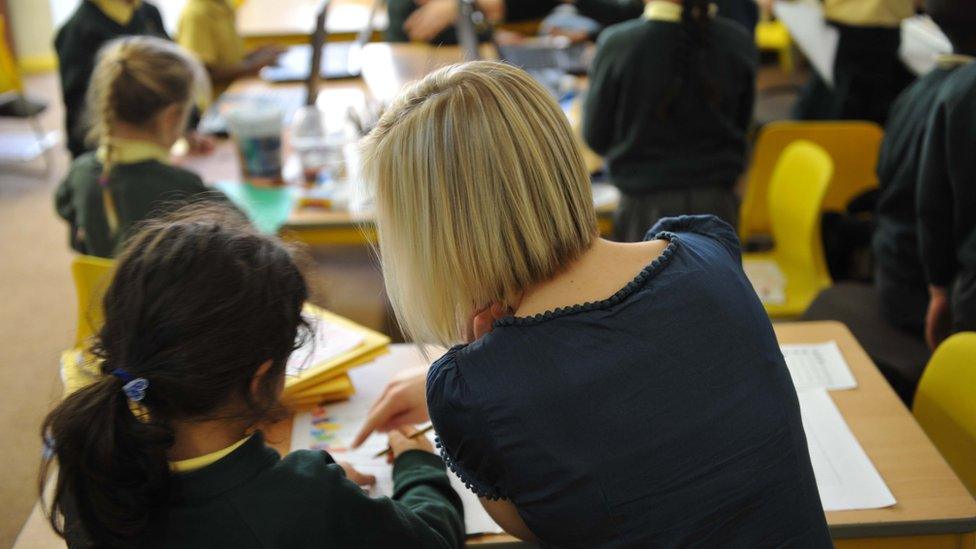Teaching union 'prepared for industrial action' over pay
- Published
- comments

The EIS is prepared to ballot members over industrial action
Scotland's largest teaching union has warned it would be prepared to take industrial action if pay does not improve significantly.
The Educational Institute of Scotland (EIS) wants teachers' pay restored to what it calls "pre-austerity levels".
Negotiations over the next pay deal will begin later in January.
The EIS is yet to announce details of its next claim but the current package - agreed in December after months of talks - included a 2% rise this month.
Any industrial action over pay by the EIS would be several months away and the union hopes it will be avoided.
A ballot of members would need to take place first.
The most recent national action in schools by the EIS was a work to contract over workload.
This was called off in the autumn of 2016 after Education Secretary John Swinney announced the scrapping of compulsory unit assessments on National 5 courses.
Teaching staff pay is agreed by the Scottish Negotiating Committee for Teachers - which includes unions, the Scottish government and employers.
'Good faith'
Finance Secretary Derek Mackay has committed to lifting the 1% public sector pay cap and providing for a 3% pay rise for NHS staff, police, teachers and others earning up to £30,000 and 2% for those earning more than £30,000.
EIS general secretary Larry Flanagan said: "The EIS will enter into this year's SNCT discussions in good faith, and we will hope that a fair agreement can be reached quickly through negotiation.
"We are very clear, however, that the finance secretary's 2% 'offer' will not be acceptable to Scotland's teachers.
"We go into these discussions with a very clear objective - to achieve a meaningful pay award that will start the process of returning teachers' pay to pre-austerity levels.
"We hope to achieve this through negotiation, but stand fully prepared to take all options - including industrial action - to ensure that teachers receive the fair pay increase that they deserve."

EIS general secretary Larry Flanagan said he hopes for a "fair agreement"
Mr Flanagan said austerity and cuts to teachers' pay were "political decisions" that had had "serious consequences" for Scottish education.
He added: "The clear message that teachers wish their employers and the Scottish government to hear is that 'enough is enough' and that the era of real-terms pay cuts must end.
"For far too long, teachers have been paying the price of austerity-driven cuts prompted by a financial situation that was not of their making.
"This has led to a decade-long decline in teachers' pay with serious implications for teacher recruitment, retention and for education provision across the country."

Analysis by Jamie McIvor, BBC Scotland education correspondent
The concern expressed by the EIS about teachers' pay is absolutely genuine, but industrial action - far less a strike - by the largest teachers' union is some way off.
The union has still to submit a formal pay claim. Negotiations involving all the main teachers' unions, the government and councils then take place.
If a satisfactory offer is not made, the EIS could ballot its members for a mandate to take industrial action.
Even if the ballot gave the union the right to call a strike, realistically any action would begin with a work to rule - for instance withdrawing co-operation from after school clubs.
So a strike is at least five steps and several months away. It is in no sense inevitable.
For those who remember the long-running teachers' strike of the 1980s, headlines warning of a strike can cause alarm.
Some schools in what were then Conservative constituencies were targeted for regular strike action in 1985 and 1986. For much of my third year in secondary school, EIS members were on strike three days a week.
However, the relationship between the current Scottish government and the main teachers' unions cannot be compared to the situation of the 1980s.
For all the very real disagreements, the relationship between the government and unions is cordial, constructive and respectful.
The possibility of concern over pay leading to a strike is remote, although the concern of teachers is real and that risk cannot be discounted.

The union argues that pay and conditions have an important role to play in ensuring that teachers remain within the profession and that more people train to become teachers.
There is ongoing concern about the difficulties some councils have faced filling vacancies - notably in some rural areas and in subjects such as science, technology and maths.
However, recent official figures showed that the number of teachers at work in Scotland had risen year-on-year.

The EIS said pay and conditions have an important role to play in keeping teachers within the profession
A spokesman for council body Cosla said: "We look forward to the discussions in relation to teachers' pay starting in early January.
"As employers we endeavour to ensure that the pay deals we reach within all our bargaining groups are fair and also sustainable."
A Scottish government spokesman said: "We are working with employers and unions, through the Scottish Negotiating Committee for Teachers, to improve pay and conditions.
"We have already taken action to reduce workload and have agreed a backdated 1% pay rise from April and a further 1% uplift from January until the end of March 2018 - backed by an additional £24m in the draft budget.
"And the education reforms being implemented by this government will create new opportunities for teachers to develop their careers.
"We will also, alongside employers and unions, take part in a strategic review of pay and reward."
- Published18 December 2017

- Published10 June 2017

- Published30 September 2016
